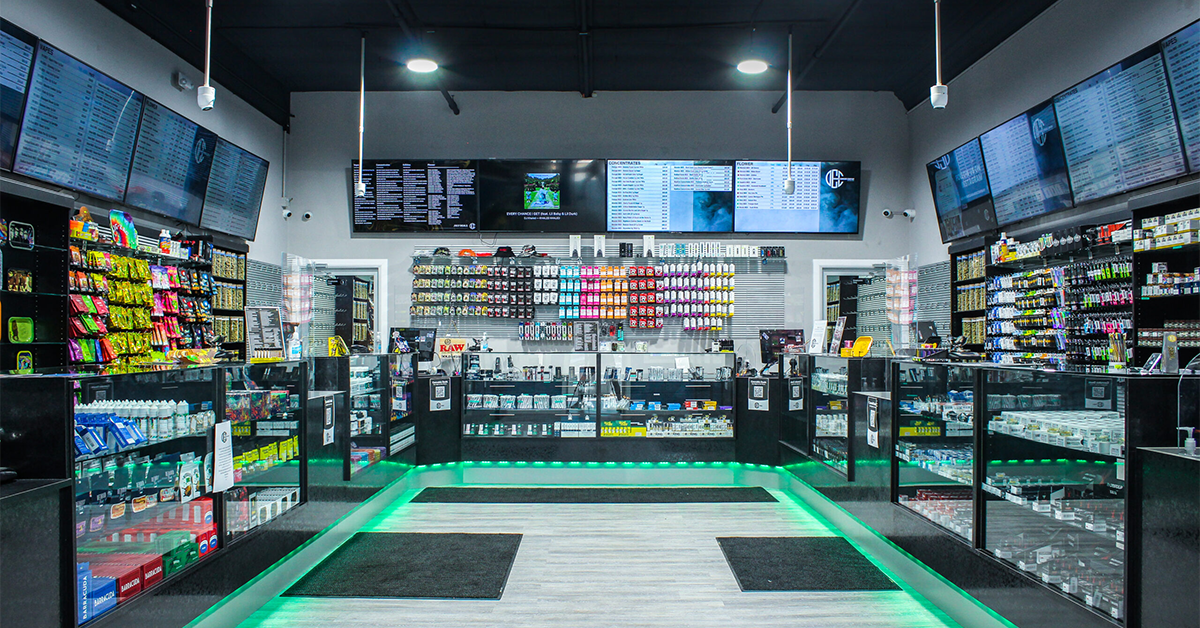Unpaid Debts and Legal Woes: The Closure of Bay City's Diamond Cannabis

In the heart of Bay City, the once thriving Diamond Cannabis store, a venture of Southfield-based Emerald Bay Provisioning, stands empty. Opened in late 2021 at 816 Washington Avenue, this marijuana retailer was initially met with positive customer feedback. However, in a stark turn of events, it has become emblematic of a growing concern in Michigan's $3 billion marijuana industry: businesses abruptly closing, leaving a trail of unpaid debts and legal complications.
Diamond Cannabis, initially backed by investors Michael Yaldo, Omar Salah, and Ramia Kirma (the latter no longer associated as per a 2023 lawsuit), showed early signs of success. But by mid-November 2023, the store was deserted, with only remnants of its past - a ladder, some boards, and rolling paper stickers on windows - hinting at its former life. The neighboring businesses noticed the exit during the summer, marking a silent end to what was once a bustling retail space.
This closure isn't an isolated incident in Bay City, where Diamond Cannabis joined a list of eleven other marijuana retailers that have ceased operations, according to the Cannabis Regulatory Agency (CRA). The issues came to a head with the filing of three lawsuits between December 2022 and June 2023, seeking over $1 million in unpaid debts, including nearly $50,000 in unpaid invoices. Moreover, CRA complaints in March and April alleged the business misrepresented THC potency, made unreported sales, and failed to maintain necessary video surveillance records.
One notable lawsuit was filed by JIS, operating the cannabis brand Bowhouse, known for "Michigan grown craft cannabis." Represented by attorney Jacob Kahn, the lawsuit details how Diamond Cannabis, after finding Bowhouse on the online marketplace Leaflink, ordered nearly $30,000 worth of products but failed to pay upon delivery. Despite a consent agreement for monthly installments, the payments ceased after the first installment, leading to a default judgment by the court.
Diamond Cannabis' story reflects a broader trend in Michigan's marijuana market. Nearly 14% of the state's marijuana retailers have closed or not renewed licenses since December 2019. This has resulted in numerous businesses grappling with unpaid debts, a challenge highlighted by attorneys Denise Policella of Cannabis Attorneys of Michigan and others. Policella emphasizes the cascading effect of these financial troubles, particularly on smaller businesses.
The CRA has recognized this growing issue and is considering rules to deny licenses or renewals to businesses with civil judgments or court orders related to unpaid debts. This move aims to ensure financial responsibility within the industry.
The root of these challenges, according to Patrick Frakes of RAIR, lies in the market's unexpected evolution. RAIR, which operates a grow facility and retail shops, has experienced the problem firsthand, with $218,000 in past due invoices at one point. Frakes points to "price compression" and market saturation as primary factors driving down prices and putting strain on businesses.
Collecting outstanding debts remains a significant hurdle, as evidenced by the experiences of attorney Kahn and his clients. Even with court judgments in hand, recouping losses from businesses like Diamond Cannabis, which shut down without assets or apparent funds, proves daunting.
Diamond Cannabis' rapid rise and fall serve as a cautionary tale in Michigan's burgeoning marijuana market, highlighting the need for more stringent financial practices and regulatory oversight to ensure stability and fairness in this evolving industry.
Addressing Odor Concerns: Lapeer's Marijuana Facility Dilemma

In Lapeer, Michigan, a debate is intensifying over the proliferation of marijuana facilities in the city. Currently, Lapeer hosts six licensed dispensaries offering both medical and recreational marijuana to those 21 and older. However, there is no cap on the number of marijuana cultivation and processing facilities in the city, which has led to growing concerns among local residents and officials.
The Lapeer Planning Commission recently chose to postpone a decision on a special land use application by a Livonia entrepreneur aiming to construct an 11,480-square-foot recreational marijuana cultivation facility on W. Genesee Street. The location's suitability for a major commercial corridor and the applicant's ability to control marijuana odors were key points of contention.
Commissioner Anne Schenck suggested that the Commission should consider advising the Lapeer City Commission to limit the number of grow facilities in the area, highlighting the issue's impact on local residents. The City Commission holds the authority to establish such limits and regulations.
The decision to allow up to six recreational dispensaries followed Michigan's 2018 referendum, but no restrictions were placed on cultivation and processing operations. Currently, approximately ten facilities grow both medical and recreational marijuana, with around half a dozen processing facilities in Lapeer.
Local concerns were voiced during the meeting's public comment period. Resident Jose Gonzales noted the high concentration of marijuana facilities along Imlay City Road, expressing surprise at the city's direction. Lapeer attorney Tim Denney also raised concerns about odor issues, suggesting the city was becoming overwhelmed by marijuana fumes.
Richard Swaine, the applicant for the new grow facility, assured that his proposed building would adhere to all regulations. However, his plans have been delayed due to complications in securing a utility easement, causing his permit and site plan applications to expire.
Jennell RaCosta, Chairwoman of the Lapeer Planning Commission, noted that previous operators also promised odor control, yet the issue persists. The Commission deferred the special land use request for further review and to allow Swaine to provide evidence of effective odor mitigation.
City Manager Mike Womack acknowledged the odor complaints, particularly from three grow facilities, and is working with various city departments to address the issue. He emphasized that a resolution would likely involve ordinance adjustments.
The Lapeer Planning Commission meets monthly, and the situation remains a significant topic for local governance and community discussion.
Menominee Mayor-Elect Tells Local Dispensaries to 'Knock It Off' Amid Legal Battles

In Menominee, Michigan, the incoming mayor, Casey Hoffman, has initiated a bold move against two local cannabis dispensaries, Rize and The Fire Station. These dispensaries are currently embroiled in a legal battle with the city over its marijuana business regulations. Hoffman, who is poised to take office shortly, has publicly urged these establishments to withdraw their lawsuits aimed at reinstating the city's original marijuana ordinance.
Hoffman's letter sharply criticizes the ongoing legal actions of Rize and The Fire Station, with one lawsuit seeking to revert to the limited-permit ordinance and another alleging corruption and conspiracy by city officials and other companies in modifying the rules. Hoffman's blunt message to these companies: "This conduct is beneath the dignity of Rize and The Fire Station. Kindly knock it off."
Responding to these remarks, Mike Cox, the attorney for Rize, defended their stance. Cox conveyed that Rize is not opposed to competition, provided the rules are equitable for all. He criticized the city council for allegedly diluting ethics rules to benefit their associates, bypassing the citizens' right to vote on marijuana policy, and creating biased regulations to favor certain companies, thereby violating state law.
Hoffman labeled the dispensaries' claims as politically motivated. He criticized the involvement of external cannabis companies in local politics and their accusations of unethical behavior among city council members without substantial evidence. He also mentioned the use of outside protestors by these companies to spread misinformation in Menominee.
The recent marijuana ordinance, which prevented a ballot initiative regarding the permit limit from reaching voters, was another point of contention. Hoffman expressed regret that Menominee citizens were not given a chance to vote on the number of dispensaries they desired, leading to an unregulated market with a potential influx of dispensaries.
The Menominee city council will soon see new faces, with Cheryl Haupt and Steve Fifarek defeating incumbents in their respective wards. Haupt, in response to Hoffman's comments about campaign funding by a company connected to The Fire Station, clarified that she was unaware of such efforts until she received a campaign mailer. Haupt also shared her view that the city should compromise on the number of dispensaries, based on a nearly evenly split public vote from three years ago regarding the presence of marijuana businesses in Menominee.
Hoffman, concerned about potential future lawsuits from other companies like Lume, Higher Love, and Nirvana, emphasized that while these companies are no different from Rize and The Fire Station, they are presently bound by a settlement agreement reached earlier this year.
With Hoffman, Fifarek, and Haupt set to assume office soon, Menominee awaits the outcomes of these contentious issues, with legal hearings for the lawsuits involving Rize and The Fire Station scheduled into the next year.
Detroit Dispensary Owner Banned for Non-Compliance with State Regulations

In a significant enforcement action by Michigan's Cannabis Regulatory Agency (CRA), Anthony Czuchra, the owner of The Reef dispensary in Detroit, along with Clark Street Investment Group Inc., has been officially prohibited from holding a business license in the state's cannabis industry. This decision follows the discovery that The Reef was engaging in the sale of cannabis to individuals without a medical marijuana card.
The CRA's Exclusion List, which documents entities barred from participating in Michigan's cannabis market, now includes Czuchra and his business. This move comes after a complaint filed in October 2022 alleged that The Reef was conducting unauthorized sales of marijuana. Subsequent to this complaint, CRA officials conducted an unannounced inspection in November, where they uncovered a series of regulatory infractions.
These violations were extensive and varied. The Reef was found to be inaccurately tracking transactions, selling unrecorded marijuana products not registered with the state, and improperly consuming food and beverages in areas designated for storing and processing marijuana products.
Clark Street Investment Group Inc. and The Reef join other entities like Candid Labs, Klean Herbal Solutions, and Pharmaco on the CRA's voluntary exclusion list, highlighting the strict regulatory environment in Michigan's cannabis industry.
During the CRA's visit to The Reef, officials discovered several concerning practices in the dispensary's storage room. These included improperly labeled products, loose cannabis flower on trays, and instances of product contamination by the owner himself while rolling pre-rolled joints. Notably, Czuchra admitted to altering the strain names of certain cannabis products, changing 'Banana Runtz' to 'Grinch Mints' for the holiday season, a clear violation of state policy.
This incident underscores the rigorous standards set by Michigan's regulatory bodies for cannabis businesses and serves as a cautionary tale for other operators in the industry.
Michigan Cannabis Market in November: Steady Growth Amidst Slight Declines

In November, Michigan's cannabis market saw a marginal decline in sales, totaling $260.5 million, a slight decrease of less than 1 percent from October. Despite this dip, November marked a significant 28 percent increase in sales compared to the same month in 2022, signaling robust growth year-over-year.
Adult-use cannabis sales demonstrated a notable increase, rising 35.2 percent compared to November of the previous year, reaching $256.7 million. This figure, however, reflects a marginal 0.7 percent decrease from October 2023. In stark contrast, medical cannabis sales experienced a dramatic downturn, totaling just $3.8 million. This represents a substantial 72 percent decrease from November 2022 and a 14 percent decline from October 2023, indicating a continued decline in the medical sector.
The pricing for adult-use cannabis flower averaged at $1,560 per pound, marking a 2.5 percent increase from the previous year. In terms of product categories, combined sales of medical and adult-use flower led the market with $117.5 million. Vape cartridges, encompassing both medical and adult-use products, followed with sales of $50.3 million. Concentrates also performed well, with sales reaching $28.5 million.
Looking at the broader picture of 2023, the cannabis market in Michigan has seen a 34 percent increase in sales over the first 11 months compared to the same period in 2022. This trend suggests that the state is on track to achieve approximately $3.3 billion in combined medical and adult-use cannabis sales for the entire year of 2023.
Continued Decline in Adolescent Substance Use Post-Pandemic, Reveals Latest Survey

The latest findings from the Monitoring the Future survey, conducted by the University of Michigan and financed by the National Institute on Drug Abuse, reveal a significant trend in adolescent behavior. The 2023 data indicates that the percentage of teenagers using illicit substances has remained below the pre-pandemic levels noted in 2020. This continuation suggests a lasting change in substance use patterns among adolescents following the initial drop observed after the onset of the COVID-19 pandemic.
The survey, which annually collects self-reported data on substance use from eighth, 10th, and 12th graders, showed that in 2023, 10.9% of eighth graders, 19.8% of 10th graders, and 31.2% of 12th graders reported using any illicit drugs in the past year. These figures, although reflective of the lowered levels of 2022, highlight a steady trend in adolescent behavior.
Richard Miech, the study's lead at U-M's Institute for Social Research, emphasized the importance of these findings. He noted that the persistent decline in teen substance use is significant, potentially indicating long-term reductions in future drug use trajectories. The survey, which also measures students' perceptions of drug harm, disapproval of use, and perceived availability, is crucial for understanding and tracking these behavioral trends.
In 2023, the survey captured responses from 22,318 students across 235 schools in the U.S. and found that the most commonly reported substances were alcohol, nicotine vaping, and cannabis. Notably, alcohol use among eighth and 10th graders remained stable, while there was a decline in use among 12th graders. Nicotine vaping showed a stable trend in eighth graders but declined in the higher grades. Cannabis use remained steady across all three grades surveyed.
For the first time in 2023, the survey included questions on Delta-8 THC use, revealing that 11.4% of 12th graders reported using this substance in the past year. Other illicit drug use outside of marijuana also remained stable among the surveyed grades.
In terms of abstinence from marijuana, alcohol, and nicotine, there was an increase among 12th graders, with 62.6% reporting no use of these substances in the past month. The rates remained stable for eighth and 10th graders.
The diversity of the survey's respondents was notable, with a broad representation across different racial and ethnic groups. Additionally, the survey methodology adapted to the pandemic's impact, with the majority of students completing it in person at school. However, there is an acknowledgment that those less engaged in school, a group at higher risk for drug use, might be underrepresented in these findings.
This study's results are crucial in understanding teen behavior and guiding public health strategies, especially in the context of changing policies and access to substances like Delta-8 THC.


 Helpful Links
Helpful Links